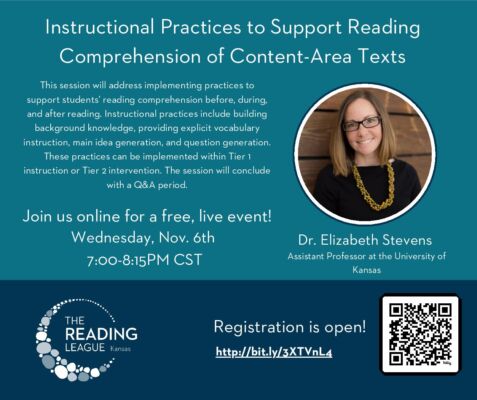The purpose of this presentation is to assist teachers with understanding and implementing reading comprehension-supportive practices for students with reading difficulties, including students with dyslexia.
Learning Objectives:
- Identify the characteristics of typical readers and students experiencing reading difficulty
- Summarize prior research on reading comprehension practices
- Explain why vocabulary knowledge is important for reading comprehension
- Identify tiered words and select important words to teach
- Identify the components of explicit vocabulary instruction
- Describe and implement a routine for explicitly teaching essential words
- Identify the steps in question generation
- Identify the steps in main idea generation
- Practice using the questioning and main idea generation steps
- Identify one practice you could implement tomorrow
Elizabeth Stevens is an Assistant Professor at the University of Kansas. Stevens completed her Ph.D. at The University of Texas at Austin. She holds a master’s degree in special education from the College of William and Mary and a reading specialist degree from the University of Virginia. Prior to pursuing her doctorate, she taught special education for nine years in Virginia. Her research focuses on improving academic outcomes for students with learning disabilities and learning difficulties. She has been awarded three IES research grants as PI or Co-PI, totaling over $7.1 million. She is PI of Project ALIGN, a 3.8 million efficacy study examining the effects of aligning reading comprehension practices across Tiers 1 and 2 for fifth graders with reading difficulties. Relatedly, she received the 2024 Early Career Publication Award from the Council for Exceptional Children’s Division for Research for an alignment study recently published in Exceptional Children. She is also PI of Math Words, a recently awarded $2.0 million grant aimed at developing a mathematics vocabulary intervention for students with math difficulty in Grades 3 and 4. Finally, she was Co-PI of a completed IES Development project ($1.4 million) focused on a professional development model to help middle school teachers implement research-based practices during content-area reading instruction. A recipient of the Rebecca Sandak Young Investigator Award from the Society for the Scientific Study of Reading, she has extensive experience in designing literacy interventions and examining their efficacy for diverse and at-risk populations, providing PD to districts, and examining the effects of such interventions through high-quality research studies. Stevens has published in numerous high-impact journals, including Scientific Studies of Reading, Exceptional Children, Journal of Learning Disabilities, Reading and Writing, Remedial and Special Education, and Teaching Exceptional Children.

